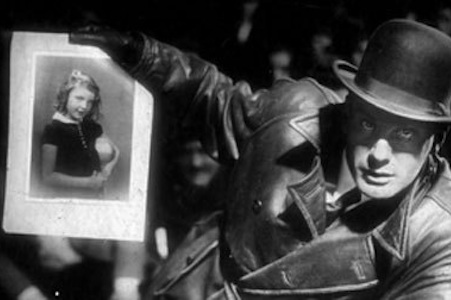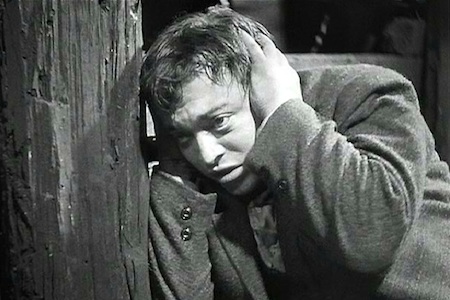
In Germany before the war
There was a man who owned a store
In nineteen hundred thirty-four
In Dusseldorf
And every night at five-o-nine
He’d cross the park down to the Rhine
And he’d sit there by the shore
—“In Germany Before the War,” Randy Newman
We readily confess to dispatching the monks deep into the LP collection on a mission marking the special occasion of the latest revival of Fritz Lang’s harrowing and still-poignant 1931 masterpiece, M. Surely you share the perverse pleasure of discovering a point of connection between an Angeleno singer-songwriter and a Viennese movie director. And not just a lone point, either. Their specific, unique portrayals of the imagined and chilling perspective of a real-life child-killer are indicative of an ability to see, and depict, the shadow accompanying the light.
Lang, with his wife and gifted co-screenwriter Thea von Harbou, had sailed through the 1920s with one ambitious triumph after another: Die Spinnen, Dr. Mabuse: The Gambler, Die Nibelungen (Siegfried and Kriemhild’s Revenge), Metropolis and Spies. The duo had created a gallery of tormentors and tormented, supervillains and powerless civilians. For the director’s switch from silent to talking pictures, they conceived a character that, pathetically, managed to be both a predator and a victim.
“I discussed with my wife, Mrs. von Harbou, what was the ugliest, most utterly loathsome crime and….we both decided that the most horrible crime was that of the child murderer,” Lang told obsessive film buff and future filmmaker Peter Bogdanovich in an interview spread over four days in 1965. “I had many friends in Berlin’s Homicide Department, which was called Alexanderplatz, and through them I came in touch with various murderers. [Peter] Kurten, the infamous killer of Dusseldorf, I never met. Our story was finished before he was caught.”
As was often the case with Lang from his arrival in the States in the 1930s until his death in 1976 in Beverly Hills (where shadow and light cohabit quite nicely, thank you), he elided, finessed or ignored the facts. The director and von Harbou had been captivated throughout 1929 and 1930 by a wave of brutal Dusseldorf attacks whose perpetrator or perpetrators had managed to throw Germans into a full-on panic. Kurten’s casualties were usually but not always children or women; it served Lang, von Harbou and M to make Hans Beckert (embodied by the immortal Peter Lorre) a child-killer.
I’m looking at the river
But I’m thinking of the sea
Thinking of the sea
Thinking of the sea
I’m looking at the river
But I’m thinking of the sea
M was revived and rereleased in 1997, a veritable eon ago. The film has been digitally restored by TLEFilms Restoration & Preservation Services (Berlin) in association with Archives Françaises du Film—CNC (Paris) and inPostFactory (Berlin), and will grace select screens around the U.S. in the coming months after its March run at New York’s Film Forum.
From an aesthetic standpoint, all these years later M still manages to transcend the myriad talented thieves (of film noir, notably) and parodists who proudly claimed its influence. With its visceral deployment of unsettling camera angles, artful and eloquent exploitation of shadows and graceful instinct for visual storytelling, the film synthesizes Lang’s silent-movie accomplishments into a powerhouse piece of highbrow pulp.
The film’s genius, arguably, lies in its ability to insinuate us into Beckert’s desperate state of mind and hopeless plight. We are certainly not child murderers, and he is unambiguously guilty and a menace to society, yet we identify absolutely with the lone, abandoned man who is targeted by both the state (the police force) and the underworld (the professional criminals).

Lang and von Harbou’s working title was “Murderer Among Us,” a transparent attempt to capitalize on the tabloid-fueled paranoia engendered by Kurten’s crime wave. (By coincidence or not, M opened mere days after his trial began.) The fatal flaw in the discarded title was that it identified Beckert as different, although not separate, from the rest of society. In Lang’s view, each of us is scarred by life, and there’s no avoiding the hand we’ve been dealt. Consequently, anyone can be twisted by hate, driven mad by the thirst for revenge and pushed over the edge into heinous, unforgivable behavior.
A little girl has lost her way
With hair of gold and eyes of gray
Reflected in his glasses
As he watches her
A little girl has lost her way
With hair of gold and eyes of gray
The director told a story, perhaps exaggerated or invented, about the manager of the Zeppelin hangars—which Lang had once used as a set and where he wanted to shoot part of M—mistakenly assuming from the working title Murderer Among Us that the movie would be critical of the Nazis. From a postwar perspective, there’s a certain grim humor to the fellow’s, shall we say, prescience.
More importantly, it confirms Lang’s perception of human nature. The destruction and suffering perpetuated by the Third Reich was carried out by “murderers among us;” that is, everyday Germans. The temptation to brand the Nazis as monsters, and the top brass as insane, sabotages our ability not only to identify the next fascist movement but to recognize our own, individual impulse toward evil.
Incidentally, those who encountered “In Germany Before the War” on Randy Newman’s 1977 album Little Criminals (his biggest hit, propelled by the tongue-in-cheek, politically incorrect single “Short People”) generally assumed that he had been inspired by M. After all, he lived in the movie capital of the world. Furthermore, although the film rarely turned up at repertory cinemas, it was not uncommon for pop singers and rock ‘n’ rollers (think Ray Davies or Bruce Springsteen) to record songs that evoked vintage movies. It was a rare artist like Bob Dylan or Warren Zevon who drew on history for inspiration and political parallels. It turned out that Newman also knew how to read.
After M, Lang made The Testament of Dr. Mabuse, in which the insane main character uttered dialogue culled from Nazi Party declarations. Minister of Propaganda Joseph Goebbels summoned the director to his office, according to Lang’s oft-told tale, to confide that he was banning the film and to offer Lang the post of head of the Nazi film industry. Cognizant that Goebbels had made him an offer he couldn’t refuse, Lang fled to Paris that night with the cash he had on hand, a gold cigarette case and a few other possessions.
I’m looking at the river
But I’m thinking of the sea
Thinking of the sea
Thinking of the sea
Lang eventually made his way to the U.S., where he produced a substantial body of work beginning with Fury (1936) and You Only Live Once (1937) that remains respected yet widely underrated. As an outsider in Hollywood, he was never accorded the power and autonomy he enjoyed in Germany. Marshaling his ample gifts of diplomacy, self-confidence, charm and imperiousness, he maneuvered around and through studio heads, producers and actors to emerge with complex, dark films about crime, self-punishment and the elusiveness of happiness.
Lang hit a groove in the mid-forties with Ministry of Fear, The Woman in the Window and Scarlet Street. His fifties films, notably Clash By Night, The Big Heat and Human Desire, resonated with a generation of adults whose innocence, idealism and dreams had been burned up, or at least singed, in World War II. His greatest contribution to the sixties was playing himself—or a character named Fritz Lang—in Godard’s savage and beautiful Contempt (1963). As a songwriter, Randy Newman performed in numerous guises and personas. One can say with some confidence that Fritz Lang was always playing a character named Fritz Lang.
We lie beneath the autumn sky
My little golden girl and I
And she lies very still



